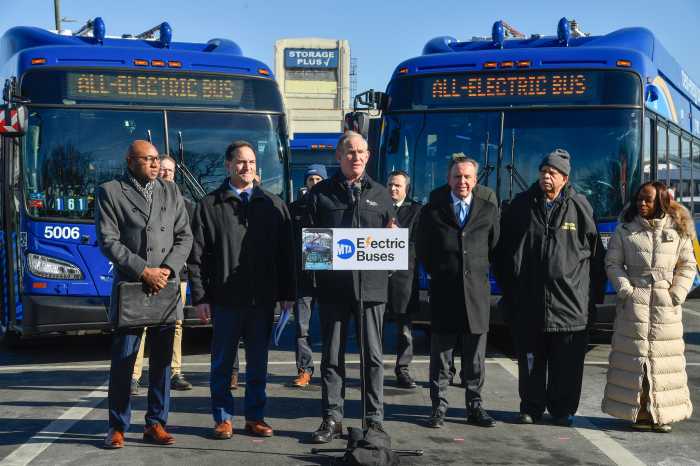Electric buses at the Jamaica depot in Queens.
Marc A. Hermann/MTA
The MTA is evaluating four types of buses as part of its goal to provide a greener fleet. But according to agency documents, some of the buses under consideration are already showing signs of reliability and performance issues.
A handful of the buses are currently in service from four production orders. They include the Articulated Clean Diesel, Express Clean Diesel, and Articulated and Standard Battery Electric Buses (BEBs). Under the recently approved 2025-2029 MTA capital plan, a future order of 2,504 buses will include the ones currently being tested on the roads. The purchase of battery electric buses is mandated by the MTA’s Zero Emissions Transition Plan.
Improved features will be part of the new buses, including continuous flip-up seats that help provide more space for walkers and strollers, and wider ramps to enable easier boarding for passengers with mobility devices.
An independent engineering consultant (IEC) is monitoring 15 bus contracts. According to MTA documents, six additional potential contracts are in various stages of development, which an IEC will survey when the contracts are granted.
Concerns arising from the testing
However, several issues have emerged during the evaluations so far. The MTA has reported concerns about battery life for 60 New Flyer BEBs, which could delay the buses’ entry into service.

According to testing, the electric buses are not meeting the contract’s goals. The batteries are supposed to have an expected eight-year life. MTA documents note a change in the battery supplier, too.
“The IEC is concerned this may affect the acceptance into service of the upcoming delivery of 205 BEBs currently projected to begin in October 2025,” MTA documents state.
The MTA said it is also concerned that the number of new buses is “inconsistent” with the agency’s goal of replacing its fleet every 12 years, requiring more money to be spent on repairs of older generations of buses.
“Delays in accepting buses into service may require the retention of older buses in service longer than would otherwise occur, with a potential increase in maintenance costs,” the documents read.
Meanwhile, to handle the electric rolling stock procurements, various MTA bus depots will continue to get outfitted with more charging infrastructure to keep buses powered up.
The MTA is expected to discuss the new buses during committee meetings at its Manhattan headquarters this week.
→ Continue reading at amNY
